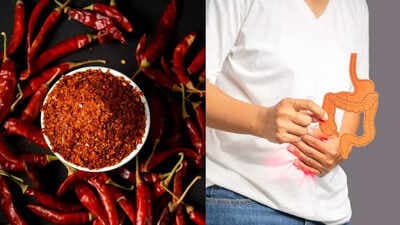The Spicy Truth: Balancing the Benefits and Risks of Red Chilli Pepper Consumption
Times of India•

Full News
Share:
Spicy foods are loved around the world for their bold flavour and heat, and red chilli peppers are at the heart of this passion. From Indian curries to Mexican salsas, these fiery ingredients are known to boost flavour and even metabolism.But in recent years, researchers have been investigating whether regular chilli consumption could be linked to health risks, including certain types of gastrointestinal (GI) tract cancers.A study published in the Frontiers in Nutrition journalhas examined this connection. The findings show a complex relationship, suggesting that while moderate chilli intake may offer some protective effects due to its antioxidant properties, excessive consumption could increase the risk of cancers affecting the oesophagus, stomach, and colon.How chronic inflammation from excess chilli pepper intake may influencestomach cancer riskThe main bioactive compound in chilli peppers is capsaicin, which gives them their characteristic heat. Capsaicin has long been studied for its health benefits, including pain relief, anti-inflammatory effects, and potential fat-burning properties. However, when it comes to cancer risk, the evidence is mixed.As reported, high or frequent consumption of red chilli peppers, especially in raw or very spicy form, may cause chronic irritation and inflammation in the digestive tract.Over time, this inflammation could contribute to cellular damage, a process that may increase the risk of cancer development. On the other hand, smaller amounts of chilli, particularly when part of a balanced diet rich in vegetables, fruits, and whole grains, are unlikely to cause harm.The increased risk of stomach cancer from eating too many chilliesThe study published in Frontiers in Nutrition reviewed findings from multiple studies involving thousands of participants. It found that high chilli pepper intake was significantly associated with a higher risk of gastrointestinal cancers, especially in regions where extremely spicy foods are consumed regularly.However, the risk appears to depend on quantity, frequency, and preparation methods:Mild to moderate consumption may not be harmful and could even offer benefits due to capsaicin’s antioxidant properties.High-intensity chilli intake (several times daily or in large portions) may increase the risk of cancers of the oesophagus, stomach, and colon.The type of chilli pepper and dietary patterns (such as low intake of fruits and vegetables) may also influence this risk.Balancing the benefits and risks of chilli pepperIt’s important to note that red chilli peppers are not inherently harmful; in fact, they offer several health benefits when consumed in moderation:Boosts metabolism: Capsaicin can slightly increase calorie burning.Supports cardiovascular health: Moderate intake may help regulate cholesterol and improve blood circulation.Provides antioxidants: Chilli peppers are rich in vitamin C, beta-carotene, and other compounds that help fight oxidative stress.However, excessive chilli consumption can irritate the stomach lining and intestines, leading to heartburn, gastritis, or discomfort. In individuals with pre-existing digestive conditions, such as acid reflux or irritable bowel syndrome (IBS), frequent consumption can worsen symptoms.Practical tips for healthy chilli consumptionTo enjoy the flavour and potential benefits of red chilli peppers without increasing your health risks:Use chilli in moderation: Add small amounts to dishes for flavour rather than excessive heat.Cook rather than eat raw: Cooking can reduce the irritation caused by capsaicin.Balance your diet: Include fibre-rich vegetables, fruits, and whole grains to protect gut health.Stay hydrated: Water and milk-based drinks can help soothe the digestive tract.Listen to your body: If you experience persistent stomach pain or heartburn, reduce your chilli intake.Disclaimer: This article is for informational purposes only and should not be considered medical advice. Please consult a healthcare professional before making any changes to your diet, medication, or lifestyle.Also read |Signs women shouldn’t drink coffee: When your body says it’s time to cut back
Disclaimer: This content has not been generated, created or edited by Achira News.
Publisher: Times of India
Want to join the conversation?
Download our mobile app to comment, share your thoughts, and interact with other readers.